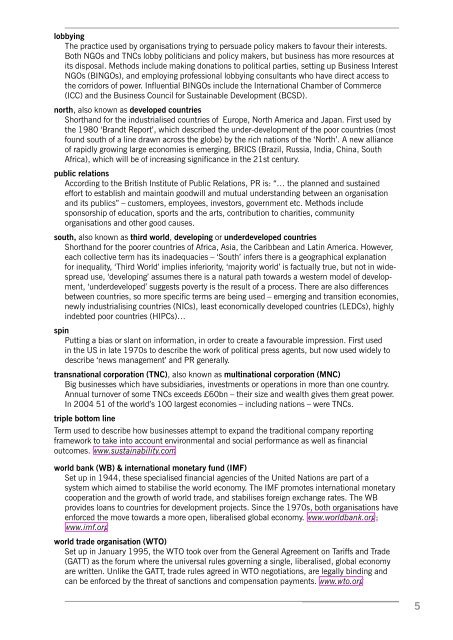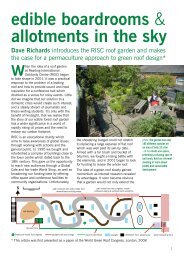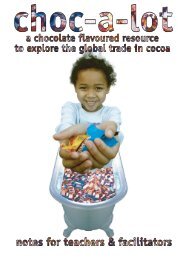Cost of coffee.indd - RISC
Cost of coffee.indd - RISC
Cost of coffee.indd - RISC
Create successful ePaper yourself
Turn your PDF publications into a flip-book with our unique Google optimized e-Paper software.
lobbying<br />
The practice used by organisations trying to persuade policy makers to favour their interests.<br />
Both NGOs and TNCs lobby politicians and policy makers, but business has more resources at<br />
its disposal. Methods include making donations to political parties, setting up Business Interest<br />
NGOs (BINGOs), and employing pr<strong>of</strong>essional lobbying consultants who have direct access to<br />
the corridors <strong>of</strong> power. Influential BINGOs include the International Chamber <strong>of</strong> Commerce<br />
(ICC) and the Business Council for Sustainable Development (BCSD).<br />
north, also known as developed countries<br />
Shorthand for the industrialised countries <strong>of</strong> Europe, North America and Japan. First used by<br />
the 1980 ‘Brandt Report’, which described the under-development <strong>of</strong> the poor countries (most<br />
found south <strong>of</strong> a line drawn across the globe) by the rich nations <strong>of</strong> the ‘North’. A new alliance<br />
<strong>of</strong> rapidly growing large economies is emerging, BRICS (Brazil, Russia, India, China, South<br />
Africa), which will be <strong>of</strong> increasing significance in the 21st century.<br />
public relations<br />
According to the British Institute <strong>of</strong> Public Relations, PR is: “… the planned and sustained<br />
effort to establish and maintain goodwill and mutual understanding between an organisation<br />
and its publics” – customers, employees, investors, government etc. Methods include<br />
sponsorship <strong>of</strong> education, sports and the arts, contribution to charities, community<br />
organisations and other good causes.<br />
south, also known as third world, developing or underdeveloped countries<br />
Shorthand for the poorer countries <strong>of</strong> Africa, Asia, the Caribbean and Latin America. However,<br />
each collective term has its inadequacies – ‘South’ infers there is a geographical explanation<br />
for inequality, ‘Third World’ implies inferiority, ‘majority world’ is factually true, but not in widespread<br />
use, ‘developing’ assumes there is a natural path towards a western model <strong>of</strong> development,<br />
‘underdeveloped’ suggests poverty is the result <strong>of</strong> a process. There are also differences<br />
between countries, so more specific terms are being used – emerging and transition economies,<br />
newly industrialising countries (NICs), least economically developed countries (LEDCs), highly<br />
indebted poor countries (HIPCs)…<br />
spin<br />
Putting a bias or slant on information, in order to create a favourable impression. First used<br />
in the US in late 1970s to describe the work <strong>of</strong> political press agents, but now used widely to<br />
describe ‘news management’ and PR generally.<br />
transnational corporation (TNC), also known as multinational corporation (MNC)<br />
Big businesses which have subsidiaries, investments or operations in more than one country.<br />
Annual turnover <strong>of</strong> some TNCs exceeds £60bn – their size and wealth gives them great power.<br />
In 2004 51 <strong>of</strong> the world’s 100 largest economies – including nations – were TNCs.<br />
triple bottom line<br />
Term used to describe how businesses attempt to expand the traditional company reporting<br />
framework to take into account environmental and social performance as well as financial<br />
outcomes. www.sustainability.com<br />
world bank (WB) & international monetary fund (IMF)<br />
Set up in 1944, these specialised financial agencies <strong>of</strong> the United Nations are part <strong>of</strong> a<br />
system which aimed to stabilise the world economy. The IMF promotes international monetary<br />
cooperation and the growth <strong>of</strong> world trade, and stabilises foreign exchange rates. The WB<br />
provides loans to countries for development projects. Since the 1970s, both organisations have<br />
enforced the move towards a more open, liberalised global economy. www.worldbank.org;<br />
www.imf.org<br />
world trade organisation (WTO)<br />
Set up in January 1995, the WTO took over from the General Agreement on Tariffs and Trade<br />
(GATT) as the forum where the universal rules governing a single, liberalised, global economy<br />
are written. Unlike the GATT, trade rules agreed in WTO negotiations, are legally binding and<br />
can be enforced by the threat <strong>of</strong> sanctions and compensation payments. www.wto.org<br />
5




